Discovering Aronia:
Poland's Antioxidant-Rich Superfood Ready to Dethrone Elderberries
Packed with over four times the antioxidants as blueberries, here’s why aronia could be the next big thing in health-food products.
12 July 2024
Share this exclusive content from Saladplate
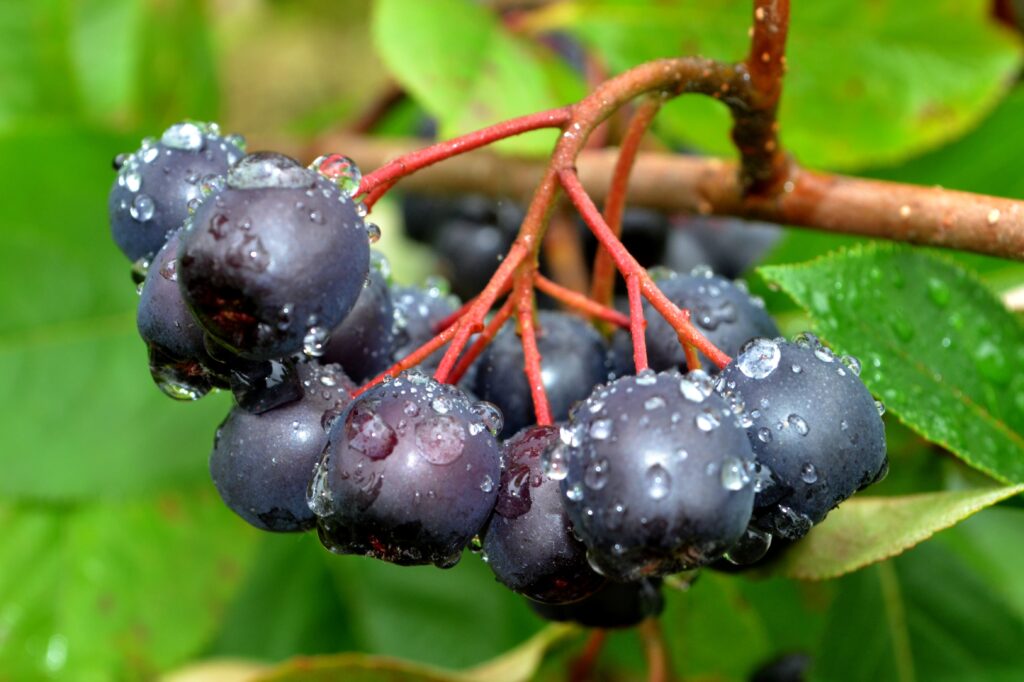
Photo caption: The aronia berry, or chokeberry, is ready to rival the likes of elderberries and blueberries as the king of antioxidants. | Photo credit: Aronia Eggert
From avocados to elderberries, from kale to blueberries, it’s no surprise that the hunt for the next revolutionary superfood has become a priority for consumers, especially since the COVID pandemic has brought wellness and health to the forefront. With more resources now directed towards research in health foods, it’s no wonder the sleeping giant that is the aronia berry is about to awaken.
“For many years, producers have been using aronia in the same health supplement products along with elderberries, but the marketing was focused on the elderberry because it had strong marketing dollars behind it. Now, aronia is growing because people are starting to learn about its health benefits,” says Paweł Eggert, a biotechnologist, master of horticulture, and the owner of Aronia Eggert, a Poland-based B2B company that invented the “Nero Eggert” strain of aronia, which makes up 70% of aronia fruits worldwide.
Aronia’s potential for health benefits, however, has been known by researchers for almost five decades.
Initially introduced as a garden bush to Russia from its natural habitat of North America in 1863 for purely aesthetic reasons, word of its beneficial properties took it across the Belarussian border and into Poland where, in 1975, it was chanced upon by a budding young scientist in the Warsaw Forestry Research Institute named Piotr Eggert, father of Paweł.
49 years on, Aronia Eggert remains the top player in the aronia industry.
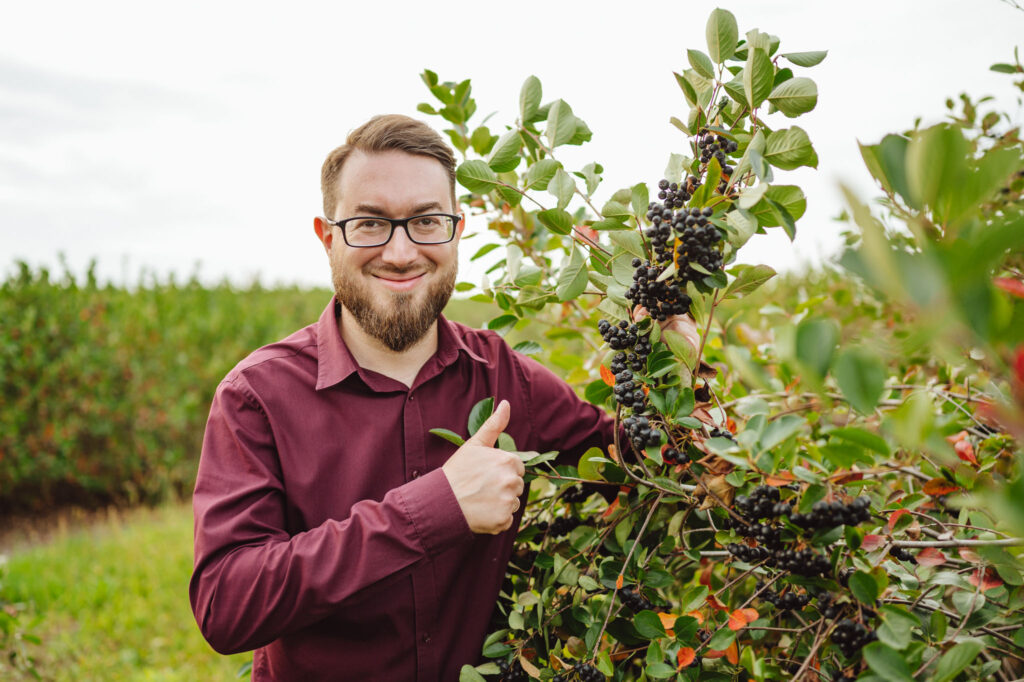
Photo caption: Owner of Aronia Eggert Paweł Eggert says the aronia berry is a fruit “too important for us to hoard its secrets” | Photo credit: Aronia Eggert
Photo caption: Owner of Aronia Eggert Paweł Eggert says the aronia berry is a fruit “too important for us to hoard its secrets” | Photo credit: Aronia Eggert
Why Aronia?
One of the most compelling reasons Aronia has captured the attention of health-conscious consumers is its inherent and superior Oxygen Radical Absorbance Capacity (ORAC) value as compared to other superfruits, which is the measure of the antioxidant capacity of a substance. Simply put – the higher the value, the more packed with antioxidants a fruit is. The ORAC value for 100g of Aronia berries was found to be 16,100 micromoles, as compared to 5,381 micromoles in a granny smith apple and 13,427 in 250g of blueberries as per the USDA. These antioxidants are able to neutralise free radical molecules in the body, a key culprit of oxidative stress, which plays a role in many conditions such as cancer, Alzheimer’s disease and heart diseases.
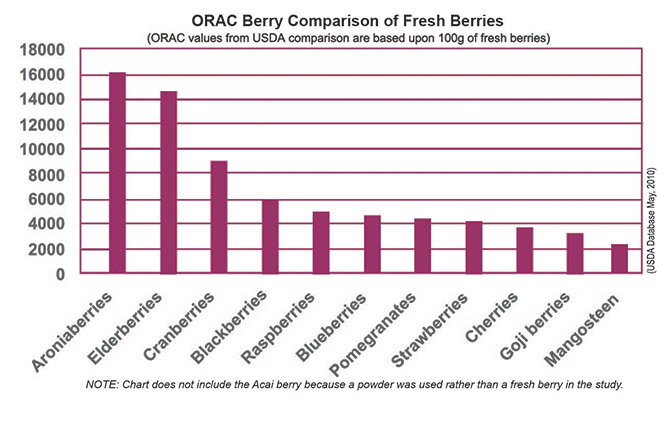
Source: Superberries.com / USDA database
Health Benefits of Aronia
Although the full extent of aronia’s health benefits are still being discovered, three of its most key qualities have been extensively-studied and clinically-proven by public institutions.
“Aronia combines all the good things we get from red wine and green tea,” explains Pawel.
“Anthocyanins and chlorogenic acids (CGAs) are abundant in aronia berries,” These compounds have been well-documented over decades to be able to regulate blood pressure, reduce bad cholesterol (low-density lipoprotein) and to normalise sugar levels, and hence are beneficial to people prone to hypertension, heart disease as related to cholesterol, and diabetes, amongst other afflictions.
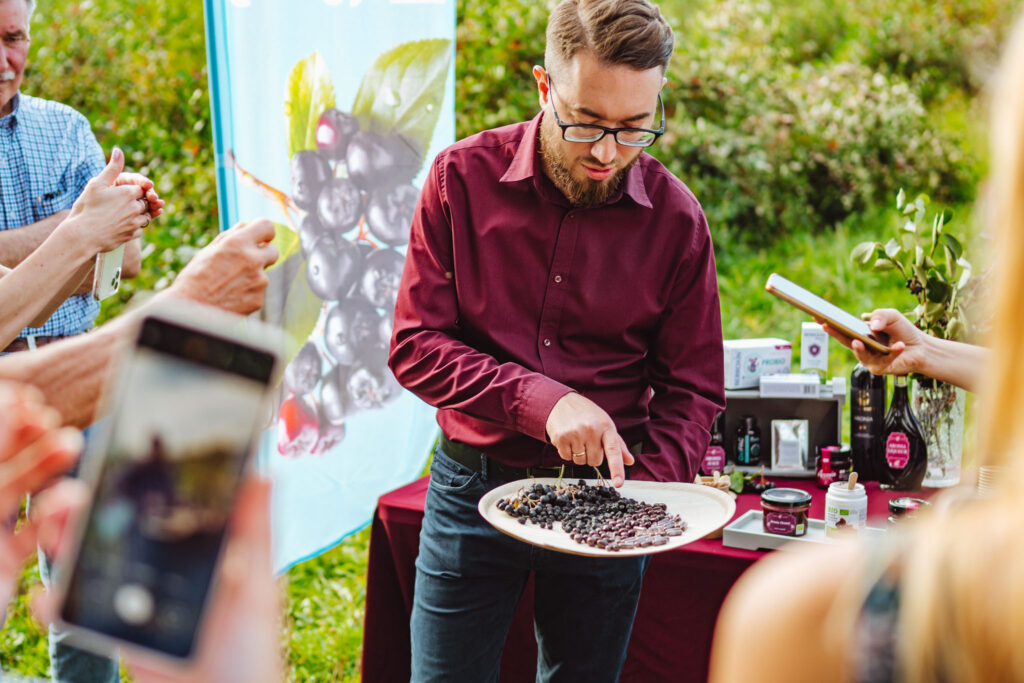
Photo caption: Owner of Aronia Eggert Paweł Eggert shares the benefits of aronia berries. | Photo credit: Aronia Eggert
In addition to those three fundamental benefits, aronia berries are also great for eye health. They contain a high amount of carotene, an essential nutrient in the protection of eye cells and prevention of cataract formation, while also harbouring antioxidants lutein and zeaxanthin which protects against the sun’s ultraviolet rays and age-related degeneration. “South Korea is one of our emerging Asian markets and aronia is part of their jet pilots’ regular diet,” shared Pawel.
Recovery after radiation exposure is another potentially groundbreaking benefit of aronia. “After the Fukushima nuclear tragedy in 2011, we had many trips between Poland and Japan because it was found to help cleanse cells after radiation exposure. We also did some clinical tests on women after breast cancer chemotherapy. After the radiation treatment, they gave the women aronia and their cells recovered much faster than expected.”
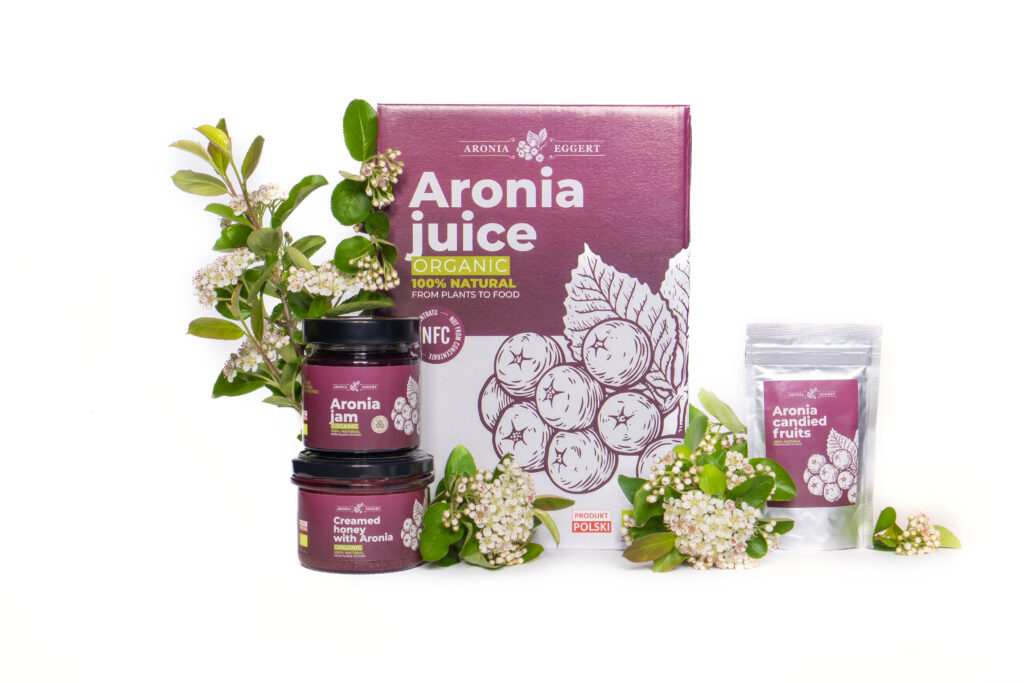
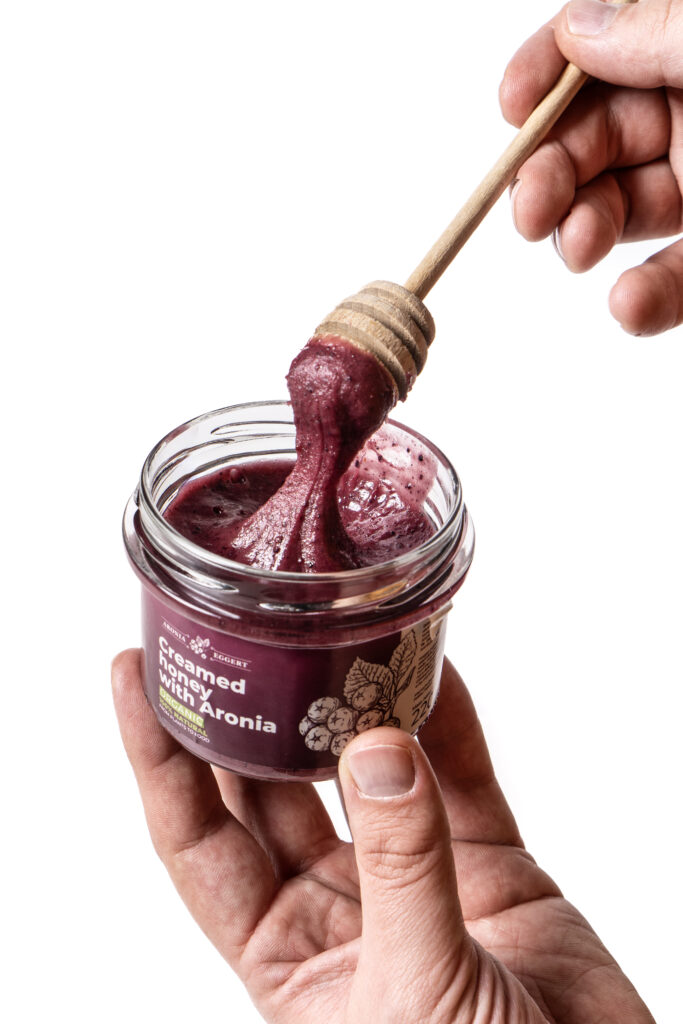
Photo Credit: L’Effervescence
Photo caption: A variety of aronia products, such as jam, honey and the very popular NFC juice. | Photo credit: Aronia Eggert
Photo caption: Creamed Honey with Aronia | Photo credit: Aronia Eggert
Consuming Aronia
Eaten as a fresh berry, aronia admittedly is a lot better for health than it is for the taste buds. In fact, its tart taste and dry mouthfeel is responsible for its nickname—chokeberry.
This particular taste, however, is the reason why aronia is highly valued. Its tart and dry properties stem from the antioxidants themselves, and so is unavoidable. Hence, aronia is most commonly distributed in the form of food products which can balance out its flavours.
“From aronia, we can make a wide range of products such as jams, honeys, freeze-dry powders, capsuled supplements and of course, the most popular is our NFC (Not-From-Concentrate) juice,” Pawel reveals. “We ship some products under private labels, so we work with our distributors who make even more distinct products. Red wine aronia is booming in Beijing right now; In Korea, they have started selling cosmetic and beauty products with aronia due to its anti-inflammation properties; In Japan, they have added candied aronia to chocolates and sweets, and even made a liquor out of aronia. It has also emerged as a viable non-alcoholic wine replacement for the teetotaler who wants something similar to wine with some added health benefits.”
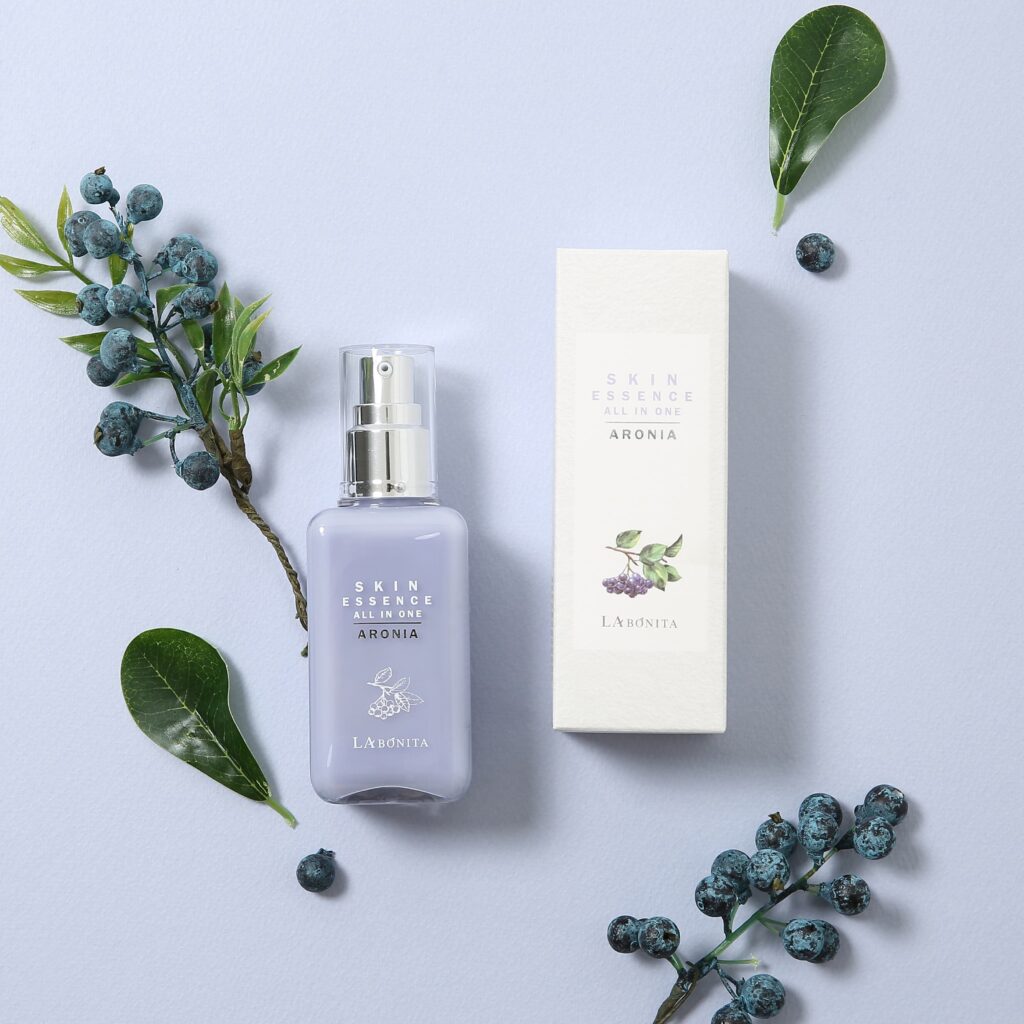
Photo caption: Aronia has started making its way into the Korean beauty industry. | Photo credit: La Bonita
Aronia Vs Other Superfoods
To rival elderberries, or any other superberry for that matter, was never the intention of Aronia Eggert. “Superberries can work hand-in-hand. Elderberries are great for flus and colds, whereas aronia’s benefits are mainly cardiovascular. In Poland, we have the Polish Superfruit Program where each superfruit takes centrestage in terms of marketing at different times of the year,” shared Pawel. In fact, it was this sentiment of cooperation that launched aronia onto the world stage in the first place.
In 2005, Aronia Eggert published an all-encompassing guide on growing the aronia plant titled “Aronia From Cutting to Harvest ”, which generously shared the company’s cultivation secrets to the world after 30 years of dedicated research, from Piotr to Pawel. “Our intention for spreading this knowledge was to help this market grow. We are selling plants but more importantly, we are selling the business. We saw value in creating a society and today, our plants are growing in 32 countries and the interest from the medical community is stronger than ever. There is too much potential in this berry, it is a fruit too important for us to hoard its secrets.”
With global demand fixed on health science since COVID-19, the aronia berry does seem like a fertile ground from which hope could blossom. With collaboration at the forefront of the aronia industry, it could be sooner rather than later that we fully understand and utilise all the blessings within this superberry.
Author: Julianna Hedger
Julianna is a seasoned content specialist who started her writing career in unscripted television production and broadcast news at FOX Sports Asia and the Associated Press. She has since added various writing skills to her repertoire, such as long-from articles, SEO-driven blogs and social media copywriting. She is driven by her personal passions in content creation, food and sports media.



